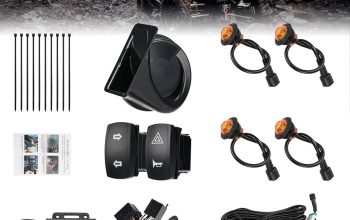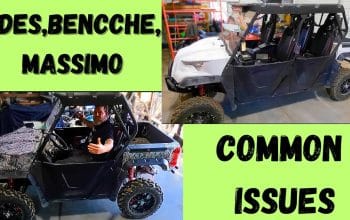John Deere Gators are not typically street legal. These vehicles are designed for off-road use and utility tasks.
John Deere Gators are versatile utility vehicles commonly used in agriculture, landscaping, and recreational activities. They offer excellent off-road capabilities, making them ideal for tasks in rugged terrains. The Gators come in various models, each tailored for specific needs such as hauling, towing, or transporting people and equipment.
Despite their robustness and versatility, most jurisdictions do not permit Gators on public roads without significant modifications. These might include adding lights, signals, mirrors, and other safety features to comply with local traffic laws. Always check local regulations before attempting to drive a John Deere Gator on public streets.
Street Legal Basics
Understanding the basics of street legality is crucial for John Deere Gator owners. Street legal vehicles must meet certain requirements to operate on public roads. Let’s dive into what makes a vehicle street legal and the common requirements you need to fulfill.
Definition Of Street Legal
A street legal vehicle is one that meets all regulations for public road use. These regulations ensure the vehicle is safe for both the driver and other road users.
Common Requirements
Meeting the common requirements is essential for making a vehicle street legal. Below is a list of typical requirements:
- Headlights: Must have functioning headlights for visibility.
- Taillights: Must include working taillights for safety.
- Turn Signals: Turn signals are necessary for indicating direction.
- Mirrors: At least one rearview mirror is required.
- Seat Belts: Seat belts are crucial for safety.
- Horn: A functioning horn is needed to alert others.
- Registration: The vehicle must be registered with the DMV.
- Insurance: Proof of insurance is mandatory.
| Requirement | Description |
|---|---|
| Headlights | Must have functioning headlights for visibility. |
| Taillights | Must include working taillights for safety. |
| Turn Signals | Turn signals are necessary for indicating direction. |
| Mirrors | At least one rearview mirror is required. |
| Seat Belts | Seat belts are crucial for safety. |
| Horn | A functioning horn is needed to alert others. |
| Registration | The vehicle must be registered with the DMV. |
| Insurance | Proof of insurance is mandatory. |
John Deere Gators Overview
John Deere Gators are versatile utility vehicles. They are designed for various tasks. These vehicles are known for their durability and reliability. Below, we explore the different types of Gators and their key features.
Types Of Gators
John Deere offers several types of Gators. Each type is tailored for specific needs. Here is a list of the main types:
- Traditional Series – Ideal for basic utility tasks.
- HPX Series – High-performance models with powerful engines.
- XUV Series – Cross-over utility vehicles for off-road adventures.
- RSX Series – Sport models designed for speed and agility.
Key Features
John Deere Gators come with a variety of key features. These features enhance their performance and usability. Here are some of the standout features:
| Feature | Description |
|---|---|
| Durability | Built with strong materials for long-lasting use. |
| Powerful Engines | Equipped with engines that handle heavy loads. |
| Versatility | Suitable for various tasks including farming and recreation. |
| Comfort | Designed with ergonomic seats for a comfortable ride. |
| Advanced Technology | Includes modern tech features like GPS and advanced braking systems. |
Federal Regulations
John Deere Gators are versatile utility vehicles. Federal regulations affect their street-legal status. Understanding these rules ensures compliance and safety. This section explores key aspects of federal regulations.
Safety Standards
Safety standards are crucial for any vehicle on public roads. John Deere Gators must meet specific requirements. These include:
- Seat belts for all passengers
- Headlights and taillights for visibility
- Turn signals for indicating direction
- Mirrors for rear visibility
Meeting these standards ensures the Gator is safe to drive on streets. Always check local laws as they may vary.
Emission Requirements
Emission requirements are set to control pollution. John Deere Gators must adhere to these standards. Federal rules mandate:
- Use of EPA-certified engines
- Regular maintenance to control emissions
- Emission control systems installed
Compliance with emission standards protects the environment. It also helps in making the Gator street-legal.
State-specific Laws
Are you wondering if your John Deere Gator is street legal? The answer depends on where you live. Each state in the U.S. has different rules for these vehicles. Understanding your state-specific laws is crucial. Let’s dive into the variations and key examples to help you navigate this complex topic.
Variations By State
State laws on John Deere Gators can vary widely. Some states allow them on public roads, while others restrict their use to private property.
Here is a quick overview:
| State | Street Legal Status |
|---|---|
| California | Not Street Legal |
| Texas | Street Legal with Restrictions |
| Florida | Street Legal in Certain Areas |
| Ohio | Not Street Legal |
Key Examples
California: John Deere Gators are not street legal in California. You can only use them on private property or designated off-road trails.
Texas: In Texas, Gators can be street legal with some restrictions. You need proper lighting, mirrors, and a registered license plate. Also, you can only drive them on roads with speed limits below 35 mph.
Florida: Florida has specific areas where Gators are allowed on the streets. These areas usually have low traffic and speed limits below 35 mph.
Ohio: In Ohio, Gators are not street legal. You can only use them on private land or off-road trails.
Understanding your state’s specific laws is essential. Check with your local DMV for the most accurate information.
Modifications For Compliance
Making a John Deere Gator street legal requires several modifications. Understanding these changes will help you stay compliant with local laws. Let’s dive into the modifications needed to get your Gator on the road.
Necessary Changes
To make your John Deere Gator street legal, you’ll need specific modifications. These modifications ensure your vehicle meets local regulations. Here are some of the key changes:
- Headlights and Taillights: Install functional headlights and taillights.
- Turn Signals: Add turn signals for safer lane changes.
- Horn: Equip your Gator with a horn for alerting others.
- Mirrors: Install side and rearview mirrors for better visibility.
- Speedometer: Add a speedometer to monitor your speed.
- Reflectors: Place reflectors on the sides and rear.
- Seat Belts: Ensure seat belts are installed for safety.
Cost Considerations
Modifying your John Deere Gator for street use involves costs. These costs vary based on the modifications needed. Here’s a breakdown of potential expenses:
| Modification | Estimated Cost |
|---|---|
| Headlights and Taillights | $100 – $300 |
| Turn Signals | $50 – $150 |
| Horn | $20 – $50 |
| Mirrors | $30 – $100 |
| Speedometer | $50 – $200 |
| Reflectors | $10 – $30 |
| Seat Belts | $50 – $200 |
These costs can add up, so plan your budget accordingly. DIY installations can save money but may require more time. Professional help ensures proper compliance but may be pricier.
Insurance And Registration
Ensuring your John Deere Gator is street legal involves more than just following local traffic laws. Insurance and registration play crucial roles in keeping your vehicle compliant. Learn about the best insurance options and the registration process to keep your Gator on the right side of the law.
Insurance Options
Having the right insurance for your John Deere Gator is essential. Different insurance types can cover various aspects of your Gator’s use. Here are some options:
- Liability Insurance: Covers damages if you are at fault in an accident.
- Comprehensive Insurance: Covers non-collision damages like theft, fire, or vandalism.
- Collision Insurance: Covers damages to your Gator from a collision.
- Uninsured Motorist Insurance: Covers damages if the other driver is uninsured.
Check with insurance providers to find the best policy for your needs. Ensure it complies with local laws.
Registration Process
Registering your John Deere Gator is essential for legal street use. The process can vary by location, but here are the general steps:
- Check Local Laws: Verify if your area allows Gators on public roads.
- Gather Required Documents: Typically, you need the title, bill of sale, and proof of insurance.
- Complete Registration Forms: Fill out the necessary forms from your local DMV.
- Pay Fees: There may be registration and licensing fees.
- Get Inspection: Some areas require a vehicle inspection to ensure roadworthiness.
Follow these steps to keep your John Deere Gator compliant and ready for the road.
Practical Considerations
John Deere Gators are popular utility vehicles. Before using them on roads, consider practical factors. These factors ensure safety and legal compliance.
Performance On Roads
John Deere Gators excel off-road. But their performance on roads varies. They have lower speeds than regular cars. This can cause traffic issues on busy streets.
Gators also have different handling. They are designed for rugged terrain. This design affects their road performance. Tight turns and fast stops can be challenging. Tire types also affect road handling. Off-road tires wear faster on paved roads. Consider installing road-friendly tires.
Maintenance Needs
Regular maintenance is crucial for road safety. Gators need more frequent checks when used on roads. Road use causes different wear and tear.
Key maintenance tasks include:
- Checking tire pressure
- Inspecting brakes
- Ensuring lights and signals work
- Regular oil changes
Keep a maintenance schedule. This ensures your Gator stays road-ready. Always have spare parts available.
| Maintenance Task | Frequency |
|---|---|
| Tire Pressure Check | Weekly |
| Brake Inspection | Monthly |
| Light and Signal Check | Before Each Use |
| Oil Change | Every 3 Months |
Always follow the manufacturer’s guidelines. This ensures optimal performance. Keep your Gator in top shape for safe road use.
Alternatives To John Deere Gators
If you’re wondering about alternatives to John Deere Gators, you have plenty of options. Many other UTVs offer comparable features and benefits. Let’s explore some other UTVs and compare them with Gators.
Other Utvs
Several brands produce quality UTVs that compete with John Deere Gators. Polaris, Can-Am, and Kawasaki are well-known names in this sector. Each brand offers different features to meet various needs.
- Polaris Ranger: Known for its durability and versatility.
- Can-Am Defender: Offers high performance and advanced technology.
- Kawasaki Mule: Famous for its reliability and rugged design.
| Brand | Model | Key Feature |
|---|---|---|
| Polaris | Ranger | Durability |
| Can-Am | Defender | High Performance |
| Kawasaki | Mule | Rugged Design |
Comparison With Gators
John Deere Gators are known for their reliability and versatility. But how do they stack up against other UTVs?
- Polaris Ranger: Offers more customization options but at a higher price.
- Can-Am Defender: Provides advanced tech features but can be less durable.
- Kawasaki Mule: Known for rugged use but lacks some modern comforts.
When choosing a UTV, consider what features are most important to you. John Deere Gators are a solid choice, but there are many alternatives available that might better meet your needs.
Frequently Asked Questions
Can A John Deere Gator Go On The Road?
A John Deere Gator can go on the road if it is street legal. Requirements vary by location. Check local laws.
Is A John Deere Gator Considered An Atv?
A John Deere Gator is classified as a UTV, not an ATV. UTVs are utility vehicles designed for work and recreation.
What Are John Deere Gators Classified As?
John Deere Gators are classified as utility vehicles. They are designed for off-road use, capable of transporting materials and people efficiently.
Are Gators Street Legal In Texas?
Gators are not street legal in Texas. They are classified as off-road vehicles. Use them only on private property or designated areas.
Conclusion
Determining if John Deere Gators are street legal depends on local regulations. Always check with local authorities before driving one on public roads. Understanding the rules can help you avoid fines and ensure safety. Stay informed and enjoy your John Deere Gator responsibly.


